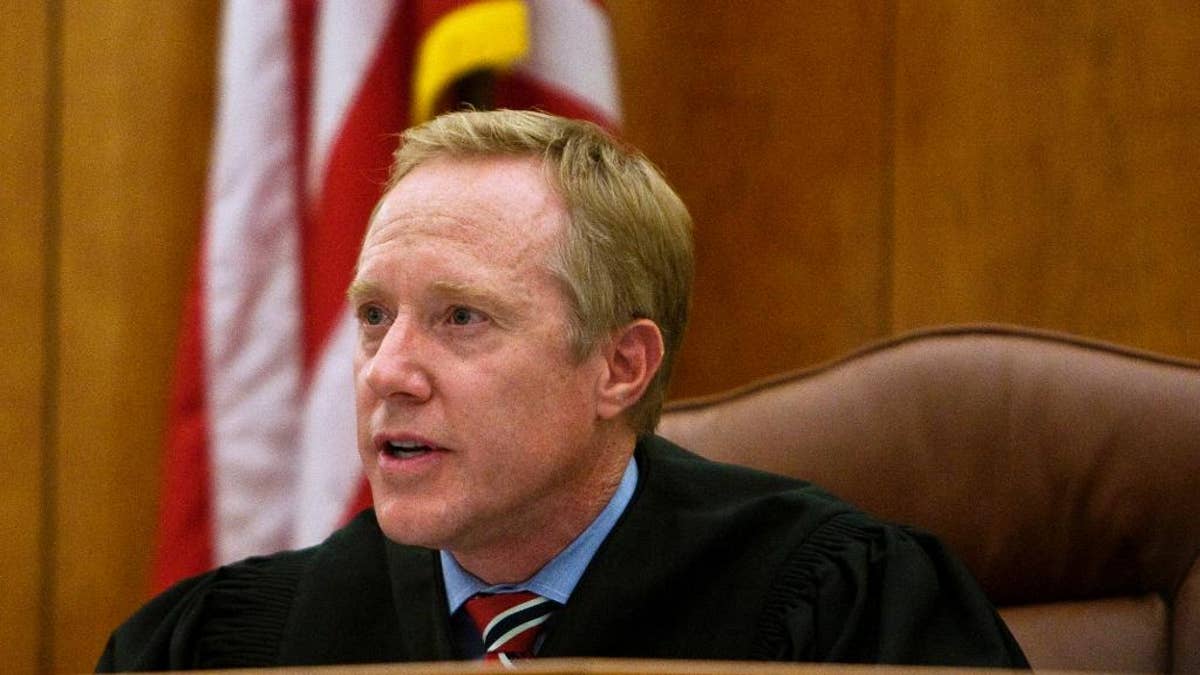
FILE - This Dec. 13, 2011, file photo, Judge Thomas Low speaks during a sentencing hearing at the 4th District Court in American Fork, Utah. A Utah judicial oversight commission representative says the number of comments about Low calling a convicted rapist a "good man" during his sentencing hearing has nearly tripled since Friday, April 14, 2017. Jennifer Yim said Monday, April 17, 2017, that she has received in total about 120 emails, phone calls and Facebook messages about Judge Thomas Low. The messages started coming in late March when Low came under scrutiny for letting Keith Robert Vallejo out of custody after a jury found him guilty of 10 counts of forcible sexual abuse and one count of object rape.(Chris Detrick/The Salt Lake Tribune, via AP, Pool, File) (The Associated Press)
SALT LAKE CITY – Complaints keep pouring in about a Utah judge who called a convicted rapist a "good man" during his sentencing hearing. But the chances of the judge being punished appear slim because his remarks don't seem to fit within any of the five forms of judicial misconduct that would trigger reprimands, one expert said.
At least four of these categories of misconduct don't apply to Judge Thomas Low's remarks, Paul Cassell, a professor of criminal law at the University of Utah, said Monday. The fifth category would only apply if officials determined that his comments were damaging to the administration of justice, which is difficult to prove, Cassell said.
Last week, Low sentenced Keith Robert Vallejo, a former Mormon bishop, to up to life in prison after a jury found him guilty of 10 counts of forcible sexual abuse and one count of object rape.
The judge is now facing a deluge of complaints after saying during the hearing, "The court has no doubt that Mr. Vallejo is an extraordinarily good man .... But great men sometimes do bad things."
Utah's Judicial Conduct Commission is tasked with investigating judges who receive complaints. It can then make a recommendation to the state's Supreme Court about whether the judge should be reprimanded or removed.
Democrat Rep. Brian King, the commission's chair, said the group looks into every complaint it receives, but such information is confidential. If the commission decides to conduct an investigation, it could take months, he said.
A Utah LGBT-rights group, Restore our Humanity, plans to file a complaint with the commission against the judge later this week. Mark Lawrence said the group has identified a handful of reasons the judge should be sanctioned, including bias and a lack of independence.
The judge's remarks "are exactly the type of things that make it difficult for victims and survivors of sexual abuse to come forward," Lawrence said. "It was completely outlandish for him to say that."
Jennifer Yim, a representative from another state judicial oversight commission, said the group has received in total 120 emails, phone calls and Facebook messages about Low since late March, when the judge came under scrutiny for letting Vallejo out of custody after his conviction. But the vast majority of them have come since Low's remarks at Vallejo's sentencing hearing.
Yim said on average her organization receives about two or three comments about judges each week, so this is "an extraordinary number."
She wouldn't say whether or not these were all complaints, but she said: "It'd be pretty unlikely that people would write to praise him."
Low declined comment through a spokesman who said judges aren't supposed to comment on cases that are still pending.
The sexual abuse occurred in Provo, a Mormon stronghold that is home to Brigham Young University. Low attended the school, where almost all students are Mormon, but it is not clear whether he is a member of the faith.
In the faith, bishops are regular church members who lead their congregations for four to five years. The position is unpaid and part of the religion's lay clergy structure that makes it different from many other religions.

